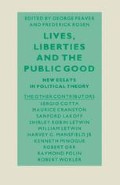Abstract
If politics be theatre, a drama within the play of life, what is political philosophy? Prompting from the wings? Puppeteering from the proscenium? Or can the philosopher hope to realise Plato’s aspiration to be actor-manager of the whole show? These questions concern all who have both an instinct for liberty and a nose for philosophy.
Access this chapter
Tax calculation will be finalised at checkout
Purchases are for personal use only
Preview
Unable to display preview. Download preview PDF.
Notes
Thomas A. Spragens, The Politics of Motion (London, 1973 ).
For an example of the perplexity which results from seeking only univocal logic in Hobbes’s treatment of liberty, see J. R. Pennock, ‘Hobbes’s Confusing Clarity, the Case of Liberty’, in Hobbes Studies, ed. K. C. Brown (Oxford, 1965 ).
Editor information
Editors and Affiliations
Copyright information
© 1987 George Feaver and Frederick Rosen
About this chapter
Cite this chapter
Orr, R. (1987). Hobbes on the Regulation of Voluntary Motion. In: Feaver, G., Rosen, F. (eds) Lives, Liberties and the Public Good. Palgrave Macmillan, London. https://doi.org/10.1007/978-1-349-08006-9_4
Download citation
DOI: https://doi.org/10.1007/978-1-349-08006-9_4
Publisher Name: Palgrave Macmillan, London
Print ISBN: 978-1-349-08008-3
Online ISBN: 978-1-349-08006-9
eBook Packages: Palgrave Political & Intern. Studies CollectionPolitical Science and International Studies (R0)

